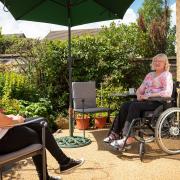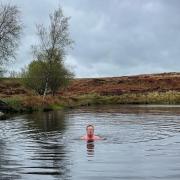Evolutionary Fitness has been quietly gathering a following over the past ten years and now it is hitting the mainstream. It’s all about getting back to your hunter gatherer roots and remembering that man (and woman) is basically a wild animal. Alice Morrison went to Kenya to find out more

It was a particularly drab, rainy December day in the High Peak. Dreich is what we would call it in Scotland. Reaching for another biscuit, I looked down at a roll of fat around my middle – who am I kidding? several rolls of fat – and decided that something had to be done.
I have always liked being outdoors and active, that is one of the many reasons I love living in Hayfield. The hills are on the doorstep. But I had definitely had too many months of over-eating and under-exercising and had been spending a lot more time in front of the television than on Kinder Scout.
Time and again, I go through the cycle of getting fit and eating well and then letting it go and lapsing back into bad ways, with obvious consequences. A good friend of mine had been proselytizing about the benefits of a fitness holiday she had done, called Wild Fitness, which looked at the whole philosophy of living a healthier life, so I decided to give it a try.
A long way from the High Peak
Brilliant sunlight, waving palm trees through an Arabic arch and the bright blue of the Indian Ocean met me as I walked up to the house at the Wild Fitness centre in Watamu in Kenya. There could not be a more beautiful setting for my nine days of ‘Kick Start’.
Wild Fitness looks at three things: wild eating, wild moving and wild living and gives those to you as a blue print for living a healthier life. Everything is filtered through nature and evolution and the central message is that we are basically animals who have moved too far away from our life in the wild and got way too comfortable in the zoos of our own making.
There we were, the twelve protagonists – so tempting to write victims – all ages, shapes and sizes and from all over the world. Although very different, we shared one goal, which was to get fitter and to learn more about how to live a healthier life. Then our coaches arrived. A very impressive bunch including pro-athletes, experienced trainers and Gareth who would give Tarzan a serious run for his money.
Before we were let loose on any physical activity, we were assessed. For the 9-day kick start course there is no weighing, fat callipers or measuring tape. There is a postural chart which you are photographed against in your swimsuit and some movement exercises including boxing, lifting and jumping. These are all videoed.
I wanna walk like you, talk like you...
Running like a bear – how difficult could it be? The answer is pretty difficult but not nearly as bad as hauling yourself along like a mudfish. One of our very first sessions took wild movement to a whole new level for me. In the shade of the Dojo, with monkeys looking on and no doubt jeering, or maybe cheering, we ran back and forth on all fours or on our bellies. Chimpanzee – two arms in front then pull your back legs through. Angry Chimpanzee – the same but slap your hands and make lots of noise. Bear – one hand in front of the other with legs flicking up behind. Leopard – make like a marine under fire in a war zone. After an hour of this, I was absolutely exhausted and totally exhilarated. It felt like the equivalent of a half marathon or 100 mile bike ride but using my whole body. Then it was on to the beach for some games and a dip in the sea which was heaven. The next day my quads and abs were screaming for mercy. I have never felt such pain, but it was proof that the workouts are a real challenge.
Each day was different but here is a typical schedule: 6.45am Boxing Fundamentals; 8.30am Breakfast; 10am Running Efficiency and Barefoot Fundamentals; 12noon Wild Eating Workshop; 1pm Lunch; 4.15pm Hanging and Climbing Skills Combo; 7.15pm Dinner. As you can see, it is not a full-on, non-stop boot camp approach. But each fitness session was extremely intense and the rest periods meant we were fit to tackle the next. We settled into a rhythmn of an intense pre-breakfast session, a good skills session after breakfast, and then the well-named sweat session after 4pm.
Cult or conditioning?
Philosophy is a word which makes me instantly suspicious as I fear indoctrination but it is a good way to describe the whole Wild Fitness approach which looks at different aspects of life. Tara Wood, the founder, says, ‘Our evolutionary environment, our natural instincts and the nature that surrounds us whisper wisdom of how we should live.’ That living has to cover diet and exercise but also life and dealing with its stresses, and most importantly, rest and recovery.
Wild Eating
I have never eaten food as good as that we were fed at Baraka House in Watamu. All of it was healthy and delicious. On our first night we had a feast, starting off with tiny, sweet wild oysters from the nearby Creek and smoked sailfish, moving through delicious curried meat and seven different combinations of vegetables and salad, each delicately seasoned, and finishing with chocolate mousse made of avocado and pure cocoa.
Lectures, discussions and a cooking lesson were designed to help us work out how we could adapt this when back home. The ideas are beautifully simple; we should eat real food from a healthy ecosystem, with plants as a mainstay and a good amount of animal protein and fat. Don’t go crazy on dairy food, avoid too much grain and regard sugar as the devil’s tool! As Jess, our Head Coach, kept saying, ‘If your Grannie wouldn’t recognise it, don’t eat it.’
Enjoy life is the mantra. There are no prohibitions or diets or denials. Since we know that rules are made to be broken, giving us the basic principles and tools instead of a set of rules makes us more responsible and more likely to follow the regime. And the golden rule is 80/20 – so I feel I can have that ice cream/beer/toast and butter, just not all the time.
Wild Living
Unusually, for a fitness-based experience, they put Wild Living at the top of the triangle for good health. If, like me, you spend a lot of time at a desk, in a car or in front of a screen, this is a quite a step, but essentially it is about arousal (work/exercise) versus rest and digest. In our modern lives we have too much of the first and need to strike a balance. The idea is to move, eat and rest proportionately. Stress helps us get fat and sick, and we all have some level of it, but by taking some time out every day to move and to exercise, we can help alleviate it. Simply, we should balance arousal with downtime, spend time in nature because essentially we are animals, sleep 7-9 hours a night, breathe properly and address sources of stress instead of trying to ignore them.
Wild Movement
Cycling, preferably slowly for a long way, is one of the things I enjoy, so I was a bit dismayed when I arrived to find that cycling was considered bad because it gives you postural problems and is not as ‘upstream as using natural movement’ and endurance training doesn’t burn more fat.
From the very first session, it became obvious why the coaches favour short, sharp, intense training. In just six minutes of sprinting intervals I had used up more energy than a 5km run. After the first full day, which held three sessions of activity, I could no longer walk down steps straight because my legs had had such a heavy workout but the good news is this did wear off and I felt stronger and fitter.
Movement, then, is based on what our hunter-gatherer ancestors did: walking, running, moving on all fours, jumping, throwing, catching, lifting, balancing, climbing, carrying, defending and swimming. The theory is that in terms of evolution, we have spent much longer as hunter gatherers than as agrarians and now computer slaves, so our bodies are still naturally more attuned to that way of living. We are not made to be sitting down all day – in fact the seated posture has become our enemy. We need to be upright more and move more in a natural way. Head Coach, Jess, puts it like this, ‘We use evolution as a filter. This helps ground us as all the new ideas come in. It stops us from going mad for every new fad or gadget ... rushing out to buy the power plate.’
‘Zoo rehab’ is one way the team describe the course and that takes on a whole new meaning when you are hanging precariously from monkey bars. They focused on three key areas:
• Wild running (barefoot) where you land on your toes and ball of your foot rather than your heels. Running is the most basic human movement pattern and helps elasticity and rhythmn, posture and good digestion.
• Boxing which helps you to defend yourself but also builds strength, elasticity and rhythmn
• Lifting which adds to our body weight and needs skill and elasticity. It also strengthens your back.
Jack of all trades in this context is a very good thing. Variety and fun made even the most intense and painful sessions go quickly and brought the whole body into the workout. The other key advice to take home was to get outside.
Typical Menu
Lunch Day 1
• Tuna carpaccio with capers
• Cole Cole fresh fish kebabs with coconut sauce
• French beans in ginger, tomato and onion
• Lemony carrot salad
• Aubergine melanzane
• Cucumber and dill
• Leafy greens and broccoli
• Salad and three choices of dressing
Did it work?
Yes, it did for me and my 11 compadres on the course. In fact I liked it so much I decided to extend and do the longer course. After just nine days, my posture had improved beyond recognition and my back was no longer achy. One of the rolls of fat had gone and I felt full of energy and stretch. It had also felt like a real holiday with lots of pampering from the staff, who looked after us brilliantly, great food and fun company.
More importantly, I took something really valuable home with me. It isn’t complicated, it isn’t difficult, it makes sense, it doesn’t make you feel guilty if you want to have a slice of cake in Rosie’s Tea Rooms. The dynamic movements we have been taught feel natural and good for the body. Jess said, ‘We just want you to look at life in a slightly different way when you go home and we hope that is what you will be doing.’ I will be and I will be doing the two things we were told throughout the nine days – enjoying life and having fun.
Information
Flights are Kenya Airways or British Airways to Nairobi and then a domestic flight to Malindi or Mombasa where there is a transfer. Prices start at £2,250 for a 9 day kick start course. Or £650 for a weekend starter on the Isle of Wight. There are Wild Fitness centres on the Isle of Wight, Crete and Andalucia. For more info: www.wildfitness.com or www.alicemorrison.co.uk or email me on info@alicemorrison.co.uk for any other details.



























